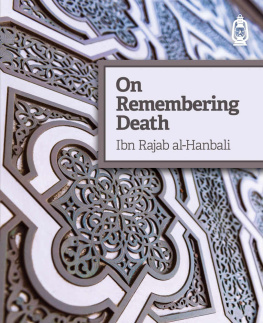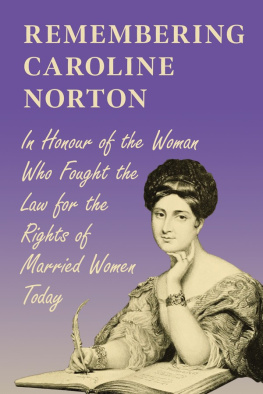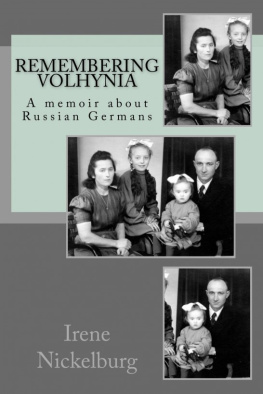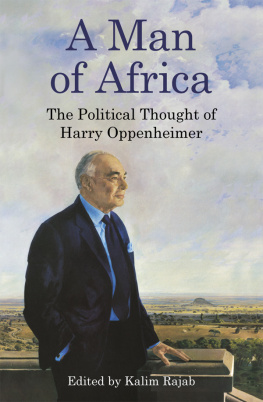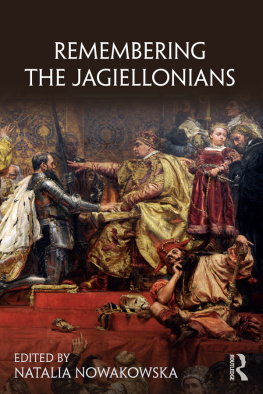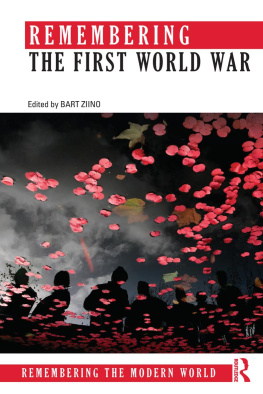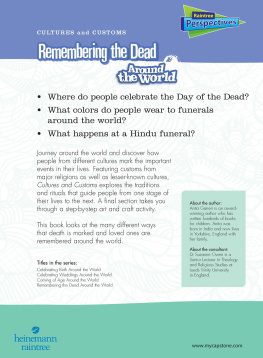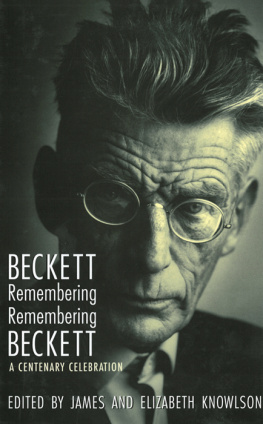Ibn Rajab Al-Hanbali - On Remembering Death
Here you can read online Ibn Rajab Al-Hanbali - On Remembering Death full text of the book (entire story) in english for free. Download pdf and epub, get meaning, cover and reviews about this ebook. year: 2018, publisher: Claritas Books, genre: Religion. Description of the work, (preface) as well as reviews are available. Best literature library LitArk.com created for fans of good reading and offers a wide selection of genres:
Romance novel
Science fiction
Adventure
Detective
Science
History
Home and family
Prose
Art
Politics
Computer
Non-fiction
Religion
Business
Children
Humor
Choose a favorite category and find really read worthwhile books. Enjoy immersion in the world of imagination, feel the emotions of the characters or learn something new for yourself, make an fascinating discovery.
- Book:On Remembering Death
- Author:
- Publisher:Claritas Books
- Genre:
- Year:2018
- Rating:4 / 5
- Favourites:Add to favourites
- Your mark:
- 80
- 1
- 2
- 3
- 4
- 5
On Remembering Death: summary, description and annotation
We offer to read an annotation, description, summary or preface (depends on what the author of the book "On Remembering Death" wrote himself). If you haven't found the necessary information about the book — write in the comments, we will try to find it.
On Remembering Death — read online for free the complete book (whole text) full work
Below is the text of the book, divided by pages. System saving the place of the last page read, allows you to conveniently read the book "On Remembering Death" online for free, without having to search again every time where you left off. Put a bookmark, and you can go to the page where you finished reading at any time.
Font size:
Interval:
Bookmark:


CLARITAS BOOKS
Bernard Street, Swansea, United Kingdom
Milpitas, California, United States

CLARITAS BOOKS 2018
This book is in copyright. Subject to statutory exception and to the provisions of relevant collective licensing agreements, no reproduction of any part may take place without the written permission of Claritas Books.
First Published in August 2018
On Remembering Death
Written by Ibn Rajab Al-Hanbali
Translated by Abdullah bin Hamid Ali
A CIP catalogue record for this book is available from the British Library
ISBN: 978-1-905837-61-8

Ibn Rajab al-Hanbali was a Muslim scholar born in Baghdad, Iraq in the year 736 AH/1335 CE and a popular exponent of the legal school of Imam Ahmad b. Hanbal. His father was known as Rajab al-Salami, and from this he acquired the byname, Ibn Rajab. At the age of eight, he relocated from Baghdad to Damascus with his father, and this is where he began his study of the Islamic disciplines. In Damascus, he studied the variant Quranic modes of recitation and amassed great knowledge from the Damascene scholars. He would eventually travel in search of greater knowledge to Mecca, Egypt, and other regions. Ibn Rajab excelled in the study of hadith and became recognised as the greatest hadith master of his time. He was also an extremely effective sermoniser and lecturer who touched the hearts of his listeners through his wisdom and charisma. Also adding to his greatness is the love and esteem in which he was held by people of diverse ideological orientations. His writings reveal a wide range of expertise covering subjects like economics, law, legal maxims, hagiography, history, ethics, spirituality, exegesis, and most importantly, hadith science. His biographers unanimously agree upon his piety, scrupulousness, exemplary behaviour, charisma, wisdom, and mastery of the prophetic tradition. He died on the 14thday of the month of Ramadan in the year 795 AH/1392 CE and is buried in the Bab al-Saghir cemetery in Damascus.

ACKNOWLEDGEMENTS
Id like to offer a word of thanks to everyone who played a part in the preparation and production of this work: To Khalil Muhsin for his sincere brotherhood, hard work, and dedication to Lamppost and the effort to provide Muslims with culturally relevant and quality Islamic knowledge. Had it not been for him and his commitment to the efforts of Lamppost contributors, the organisation would have long fallen by the wayside; to Imam Zaid Shakir who, in prophetic humility and perseverance, never turns down an opportunity to help any worthy cause and has brought so much blessing to our work. Readers will definitely find many jewels in his instructive introduction; to our board of directors ( Jeremiah Abiade, Dawood Yasin, Ustadha Zaynab An-sari, Ebadur Rahman, Masood Siddique, and Faatimah Knight). I am eternally grateful for your dedication to the mission of the Lamppost Education Initiative; to Christina Rountree, whose artistic taste we proudly display; to Mohammad Khan and his wife, Asma Barakat, for transcribing the original Arabic chapter from Ibn Rajabs Lataif; to Rasheeda Plenty for proofreading the draft of this translation; and once again to Imam Zaid Shakir and Shaykh Hamza for looking over the earliest draft of this book, and then offering some very constructive recommendations; Thanks also go to all of those without which this book would have never made it to print including: David Coolidge, Husam Mallah, Abdus-Salam Muhsin, Khushroo Shaikh, Lijia Sharifa, Mujahid Abdullah, Abid Shaikh, Rahaat Lateef, Saad Ahmad, Sadaf Khan, and the many other supporters past and present. May Allah grant you all the increase in every good thing, and may we be reunited in eternal bliss after death in the Garden of Firdaws. Amin.

FOREWORD
Death is the most inescapable part of life. Upon entering into the world, no one can say, with absolute certainty, if a particular individual will be rich or poor, a glowing success or an abject failure. No one can predict if they, or anyone else, will live a long and healthy life or see their earthly stint end during their youth. No one knows if they will be tried by disease or some other physical or psychiatric challenge. The only thing we can say about life with absolute certainty is that anyone coming into the world will eventually leave it.
Despite the absolute certainty of death, most people fail to reflect on its nature and the finality it represents. Fewer still are those who actually prepare for death by leading lives steeped in the reality that this worldly sojourn is but an introduction to another life, the everlasting life that commences with our death. One of the great gifts of religion, regardless of how it manifested itself in the teachings of a specific Prophet in a particular time and place, is that it brings its adherents face-to-face with death. This confrontation with our mortality is usually coupled with a sense of moral responsibility and accountability.
The belief that what we do during our life influences what happens to us after our death is ancient. The idea currently propagated by many atheists that we simply cease to exist in any form after our physical demise is a view that few have embraced historically. The ancient Vedic or Hindu tradition stressed the need to live a life of good because ones worldly Karmaa term that can be viewed as embodying intention, action and will determines ones otherworldly state, be that good or bad. Most animist faiths emphasise the existence of a spirit world, which is just as real as our physical world. Many of them view death as an entrance into that spirit world and posit that the fate of the spirit--that animating force in all creatures, not just humans--in terms of its stature and status in the spirit world, is determined by how one lived in the material world. Saying this is not to deny that most animist belief systems generally reject the idea of suffering in the next world owing to the sins committed in this one.
Perhaps no family of religions has stressed the idea of worldly moral responsibility determining the fate of the soul so much as the Abrahamic faiths, which include Judaism, Islam and Christianity; the latter two faiths being especially insistent in this regard. These are the faiths that have, more than any others, vouchsafed unto humanity the ideas of Heaven and Hell, salvation and damnation, eternal suffering and eternal bliss. The Bible states, I the Lord search the heart and test the mind, to give every man according to his ways, according to the fruit of his deeds (Jeremiah 17:10). Similarly, the New Testament states, I tell you, on the Day of Judgment, people will give account for every word they speak; for by your words you will be acquitted, and by your words you will be condemned (Matthew 12:37).
Islam, the youngest of the Abrahamic faiths, is perhaps the strongest in terms of the power and force with which it emphasise accountability after death. A single Quranic verse, in succinct yet stirring words, captures the inevitability of death, the moral responsibility life demands of us, the accountability awaiting us in the next life, the reality of Heaven and Hell and how easily we are deluded by the world into discounting what we will encounter after death. We read,
Next pageFont size:
Interval:
Bookmark:
Similar books «On Remembering Death»
Look at similar books to On Remembering Death. We have selected literature similar in name and meaning in the hope of providing readers with more options to find new, interesting, not yet read works.
Discussion, reviews of the book On Remembering Death and just readers' own opinions. Leave your comments, write what you think about the work, its meaning or the main characters. Specify what exactly you liked and what you didn't like, and why you think so.

